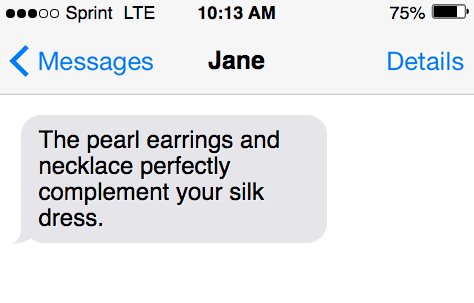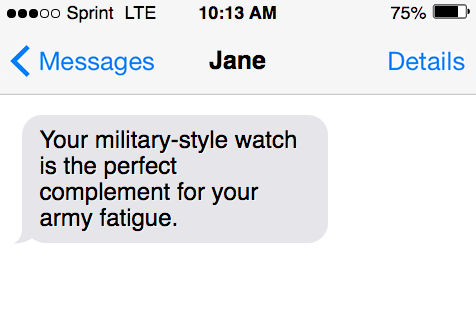Is it complimentary of complementary? You receive a note of appreciation for helping at a local charity event. The sender praises your organizational skills and mentions that you are a true people person. You want to thank her for the kind words. But you wonder which one of the below options should you write?
(a) Thanks for the complement
(b) Thanks for the compliment
You attend a Christmas party at your friend’s house and notice that her hat goes really well with her dress.
You send her a New Year’s greeting and thank her for arranging a fun-filled event. You also want to comment on her excellent fashion sense.
But you can’t decide which alternative is suitable.
(a) Your hat complemented your dress
(b) Your hat complimented your dress

Is it complimentary or complementary?
Here’s a hint. Compliment with the “i” means to express admiration while complement with the “e” means to harmonize or match something or someone.
The two words are among some of the most frequently confused terms. Up there with affect or effect and further or farther.
Moreover, the pair is homophonous, meaning you can pronounce the words similarly while the meaning differs. So you might not make the distinction between the two unless you write the words.
The definition of a “complement”
You can use the word complement as a noun and a verb. Its adjective form is complementary.
The first point to note is that the word complement is always used in a relative context.
Complement signifies that two people or two objects complete each other. In such a relationship, the complement adds something which augments the other’s traits or ability.
Complement, when used as a noun, completes what’s missing in a single entity. It fills in a lack to form a cohesive unit expressed as an improvement in functionality or a pleasant look and feel.
You can also use the noun complement to refer to the total number of people that are required to run something, especially in the context of an endeavor. This could be a hotel, restaurant staff, or a ship’s crew.

Sentence examples
- Your military-style watch is the perfect complement for your army fatigue.
- The red wine Pinot Noir complements Swiss cheeses such as Gruyere.
- The Airbus A380 has a complement of ten cabin crew and two pilots.
- Mary and Jeff are celebrating their silver anniversary tomorrow, they well and truly complement each other as a couple.
- Sarah and Laurie have a great complementary partnership at the workplace with Sarah’s creative side balancing Laurie’s sales and marketing skills.
- You should see an osteopath while you are undergoing regular physiotherapy as complementary medicine can sometimes work wonders.
The definition of a “compliment”
You can use the word compliment as a noun and a verb. Its adjective form is complimentary.
As a noun, a compliment means a flattering remark that you may say to somebody to admire something about their personality, tastes, or any action.
To compliment or to pay a compliment means to praise or say something nice about someone.
A compliment can be an informal remark in a casual setting such as at a party, or it could be a formal accolade at a public event.
The adjective complimentary signifies a behavior where someone is kind and inclined to praise everyone in a polite manner. It also indicates anything regarded favorably by everyone.
Sentence examples
- The coach complimented Joan for her performance at the swim meet.
- John was the life of the party and showered compliments on everyone he came across.
- I could not sleep a wink last night compliments to Mike’s snoring.
- Help yourself to a cookie, the café is offering complimentary goodies with every cup of cappuccino. The airline offers a complimentary breakfast for all travelers who are flying business class.
- Have you visited the new Mexican restaurant, I have heard nothing but complimentary remarks about it.
Complement as a verb
The verb “to complement” is derived from the Latin root “complēre” which means to complete something.
Complement is used as a verb to indicate some relationship between two people or aspects. If someone or something complements the other it means that the person or attribute perfects the other.
The verb indicates a harmony in the relationship not necessarily from a similar viewpoint but from differing characteristics. A complement balances the limitations of the other while boosting its capacity.
A person who complements somebody means that he or she is a perfect foil for the other. The complementary person enhances the other person’s effectiveness.
To complement also meant commending somebody, but the verb is no longer used in that context.
Sentence examples
- The pearl earrings and necklace perfectly complement your silk dress.
- The azure curtains complement the beige color of the living room.
- The football team’s defenders and midfielders complement the forwards’ adventurous play with their excellent passing and dribbling skills.
Synonyms for “Complement”
The word complement has several synonyms depending on the context and whether you intend to use it as a noun or verb.
You can broadly classify the synonyms as:
- Aggregate or addition: When you are dealing with mathematical amounts
- Companion or partner: When you want to talk about relationships between people
- Enhancement or enrichment: When you want to show the relationship between different attributes
- Balance or counterpoint: When you are expressing the parts in the context of the whole
Antonyms for “Complement”
A complement depicts a balance and harmony between two entities despite different properties. It signifies cooperation and trust to find common ground and work towards positive outcomes.
The antonyms show inherent friction between any two entities and a reluctance to work together.
The antonyms for complement:
- Contrast
- Disparity
- Dissonance
- Discord
- Disharmony
Difference between “Complement” and “Compliment”
The two words are homophones and sound similar despite having different meanings.
However, both words share common ancestry as they are derived from the same Latin root term “complēre” which means to complete something.
Complement still is related to the original meaning of balancing something or somebody in a harmonious relationship with the other. The word is used today from its Middle English tradition derived from the Latin complementum, the noun form of complēre.
Compliment has in the present come to signify a comment which indicates admiration or even flattery with regard to looks, tastes and behavior.
Compliment took a circuitous route and the word came to its present meaning from the Spanish term “cumplimiento” which means to be courteous.
How to remember which word to use
How can you discern which word to use in what context? Is it compliment or complement and complimentary or complementary?
Compliment involves making positive comments and remarks about somebody while complement is used in a comparative relation with something else.
A trick to remember the difference is that compliment or complimentary comes with an “i” which is how you begin with most compliments. Think of using complement or complementary with an “e” in any context where you think something enhances the other.
Is something that’s Complementary free?
You use the word complimentary with an “i” to describe something which is given free. Never use complementary with an “e” in such contexts.
If you receive something such as free tickets to an event from the organizers, you will say that you received complimentary tickets courtesy the event organizers.
Another example, you receive complimentary salsa when you eat at a Mexican restaurant.
Complimentary often means that you receive something free while paying for something else.
If you are staying at a hotel, eating at a restaurant or flying business class on an airline you could receive something complimentary. It could be free drinks, breakfast or toiletries.
Which is Correct, Complimentary, or Complementary?
Both words are correct when used in the proper context.
Complementary as an adjective is often used in the context of a pair. A complementary pair exists in a state of equilibrium in terms of proportion, quality and stability to make up the whole.
A complementary relationship can exist between multiple entities and not always between two things.
Complimentary is commonly used to refer to an act of kindness or something which is given free.
It could be anything that you receive as a gift. For example, you may receive complimentary tickets for a music concert from a friend or an event organizer.
Complimentary can also be used in a sarcastic manner to indicate something or somebody which has caused you some minor discomfort or loss.
Do they have the same meanings?
The two words are homophones as they sound alike but do not have the same meaning.
So is it complimentary or complementary? Any attributes that they go well together despite being different are complementary to each other. It could be colors, flavors or aromas.
It could be clothes and accessories that enhance the overall appearance. Or it could be foods that add a new dimension to the taste when served together.
Complimentary is mostly used in contexts when you receive something free. It’s often when you are paying for something else such as complimentary drinks at a restaurant or complimentary toiletries at a hotel.
When do you use complement or complementary?
Complement and complementary are both used in mathematics, science and economics in various contexts.
Mathematics
In geometry, two acute angles are said to be complementary to each other if their total equals 90 degrees, a right angle.
In set theory, the complement of a set includes all elements that are not part of that set. Both sets together make up the total. For example, the complement of the set of consonants is the set of vowels and the two sets combined make up the set of letters in the English alphabet.
Science
In physics, the light rays of complementary or opposite colors counteract each other if combined to produce a white light. The pairs of complementary colors are red and cyan, green-magenta and blue-yellow.
In biology, the complement system is a part of innate immunity which assists antibodies in clearing pathogens from an organism. The system consists of more than 20 different proteins that complement the antibodies in destroying pathogens via a process known as opsonization.
In medicine, complementary treatment includes alternative medicine such as homeopathy, naturopathy and ayurveda. It also refers to therapy such as acupuncture and reiki that complements conventional allopathic measures.
Economics
In economics, complementary goods or services are those that are offered in conjunction with some other product to boost its value. The complementary commodity may be valueless in itself or can be used only with the main product.
For example, you may receive a case and screen protector as complementary items with your smartphone.
Inside this article
Fact checked:
Content is rigorously reviewed by a team of qualified and experienced fact checkers. Fact checkers review articles for factual accuracy, relevance, and timeliness. Learn more.
Core lessons
Glossary
- Abstract Noun
- Accusative Case
- Anecdote
- Antonym
- Active Sentence
- Adverb
- Adjective
- Allegory
- Alliteration
- Adjective Clause
- Adjective Phrase
- Ampersand
- Anastrophe
- Adverbial Clause
- Appositive Phrase
- Clause
- Compound Adjective
- Complex Sentence
- Compound Words
- Compound Predicate
- Common Noun
- Comparative Adjective
- Comparative and Superlative
- Compound Noun
- Compound Subject
- Compound Sentence
- Copular Verb
- Collective Noun
- Colloquialism
- Conciseness
- Consonance
- Conditional
- Concrete Noun
- Conjunction
- Conjugation
- Conditional Sentence
- Comma Splice
- Correlative Conjunction
- Coordinating Conjunction
- Coordinate Adjective
- Cumulative Adjective
- Dative Case
- Determiner
- Declarative Sentence
- Declarative Statement
- Direct Object Pronoun
- Direct Object
- Diction
- Diphthong
- Dangling Modifier
- Demonstrative Pronoun
- Demonstrative Adjective
- Direct Characterization
- Definite Article
- Doublespeak
- False Dilemma Fallacy
- Future Perfect Progressive
- Future Simple
- Future Perfect Continuous
- Future Perfect
- First Conditional
- Irregular Adjective
- Irregular Verb
- Imperative Sentence
- Indefinite Article
- Intransitive Verb
- Introductory Phrase
- Indefinite Pronoun
- Indirect Characterization
- Interrogative Sentence
- Intensive Pronoun
- Inanimate Object
- Indefinite Tense
- Infinitive Phrase
- Interjection
- Intensifier
- Infinitive
- Indicative Mood
- Participle
- Parallelism
- Prepositional Phrase
- Past Simple Tense
- Past Continuous Tense
- Past Perfect Tense
- Past Progressive Tense
- Present Simple Tense
- Present Perfect Tense
- Personal Pronoun
- Personification
- Persuasive Writing
- Parallel Structure
- Phrasal Verb
- Predicate Adjective
- Predicate Nominative
- Phonetic Language
- Plural Noun
- Punctuation
- Punctuation Marks
- Preposition
- Preposition of Place
- Parts of Speech
- Possessive Adjective
- Possessive Determiner
- Possessive Case
- Possessive Noun
- Proper Adjective
- Proper Noun
- Present Participle
- Prefix
- Predicate



